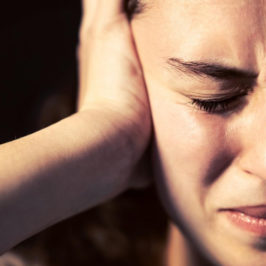
By: Aubrey Brown, LMSW
Aubrey Brown, LMSW, primarily works with clients ages 9 – 18 on issues like depression, anxiety, ADHD, interpersonal relationships, and grief. All of those can be tricky things to live with at any time of the year, but grief is especially tough in the weeks leading up to the holiday season. Because of this, we wanted to talk to him for some help in navigating the holidays after a loss. How do we make it through in one piece without living in denial about what we’re going through?
Just to start out, I was wondering what you think is the biggest thing about the holidays that can bring up a lot of feelings that make people very emotionally raw.
I think the biggest part about the holidays that can just cause us to have a lot of emotions, especially if we’ve lost someone or something, is that it’s a time where we spend a lot of time with family usually. So just kind of going back to a time where you used to maybe spend this time with someone or something, and not having it can be emotionally hard, it can be triggering, and it can be very tough, right? Around the holidays we’re expected to spend time with family and loved ones, and sometimes we have memories [of spending] a lot of time with this certain person or thing, so to now be without it, it’s very hard. It’s very hard.
And we think mostly about how that first birthday or that first Christmas can be really hard. But even years down the line, people still sometimes have a really hard time missing someone who’s not there. What do you think people can do for their grief when these important dates are coming up?
Well, I think a few things. I think the first thing is to understand is that grief isn’t linear. It’s kind of random so there’ll be days where you might feel okay, and then there will be days when it’s extremely hard to maybe get out of bed and move through life. I think one thing you can do for yourself is be kind. Know that it’s natural. That it’s a process. So whether you experienced the loss last week or three years ago, the emotions that you’re experiencing are pretty normal. Just giving yourself some kindness, being nice to yourself, doing things you enjoy . . . [while] also feeling those emotions, right? Because if we avoid or try to escape from those emotions, they won’t go anywhere. So let yourself feel, let yourself sit in it, cry if you need to. Know that it’s just a part of the process.
Do you think there’s a bad way to be processing grief?
Not necessarily. I don’t think there’s any right way to process grief. I think however we choose to do it is the way that we’re choosing. I think there are some healthier ways to process our emotions and I think sometimes the way we respond to our grief may not be the healthiest decision for us. I wouldn’t say there’s a right way or necessary a bad way, but I do think that we need to check in with ourselves, sift through our feelings, and let people help us along the way.
You were talking earlier about being “expected” to spend time with loved ones. But around the holidays when you’re going to family gatherings where you’re surrounded by these people in a festive mood, do you think it’s a valid fear some people have of being open about their grief and bringing people down?
Yeah, I think that it’s extremely valid. Sometimes we don’t want to burden others with our situations and our emotions and all I will say is, if it’s someone that you trust and care for, I think that’s an ideal person to share that with. So maybe we’re not sharing it with strangers and people that we don’t trust too much, but with our loved ones and people close to us, I think it’s important that we share that with them. That maybe we don’t really feel like celebrating today. We don’t really feel like going to that party. Maybe there’s an alternative option where you can spend time with people but not be at this big event where everyone’s feeling happy and jubilant when we don’t necessarily feel that way.
Yeah, it’s like you’re already completely drained and now on top of that you’re going to something draining.
Yeah.
We talk about seasonal affective disorder a lot this time of year. Do you think that that can magnify those feelings, or do you think it’s just totally unrelated?
I think depending on the person it definitely could. Maybe I could kind of outline it this way: if you’ve lost someone around this time so it’s already a hard time for you, and you’re dealing with seasonal depression or seasonal affective disorder, that could magnify it. It’s darker a lot longer these days and that can be depressing in itself. So I definitely think that it could have an impact. And I think at the end of the day, it’s [a reminder to] check in with yourself. Also knowing that your grief could last forever, but this season’s effect will not. It will become lighter again. You’ll probably start to feel better, and as you go through your grief, there will be days where it feels better. There will be days when it feels heavy, and that is natural. So whether it magnifies it or not, I think to me the name of the game is the same: acknowledging that we’re grieving and knowing that that is okay.
That’s like the perfect metaphor for it. How do you think we can support each other when people are having these kinds of complicated feelings, especially with something like the loss of a friend or family member?
I think what’s most important for the person that’s going through these feeling and going through this loss is to let the people around them support them and love them. So kind of being open and communicating what you’re going through so people can help. But I think it gets a lot more difficult when we hold it in, when we kind of hold that loneliness in and we let it build up. So I think the best thing for someone going through this is to let people help them. And if you know somebody’s going through this, reach out to make sure that they’re okay. Check in on how they’re doing, especially during these times.
*Interview has been edited for clarity and length.
DISCLAIMER
The information, including but not limited to, text, graphics, images and other material contained on this website are for informational purposes only. No material on this site is intended to be a substitute for professional medical advice, diagnosis, or treatment. Always seek the advice of your physician or other qualified healthcare provider with any questions you may have regarding a medical condition or treatment and before undertaking a new health care regimen, and never disregard professional medical advice or delay in seeking it because of something you have read on this website.






